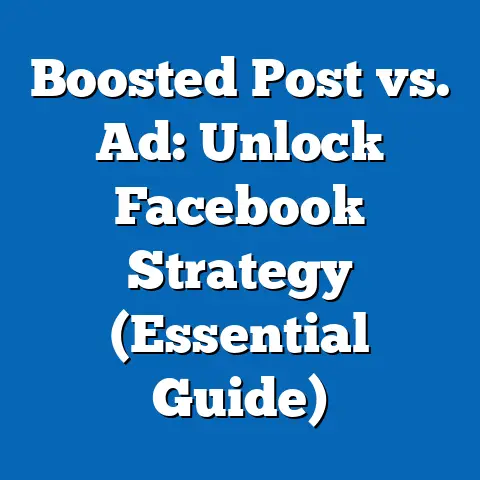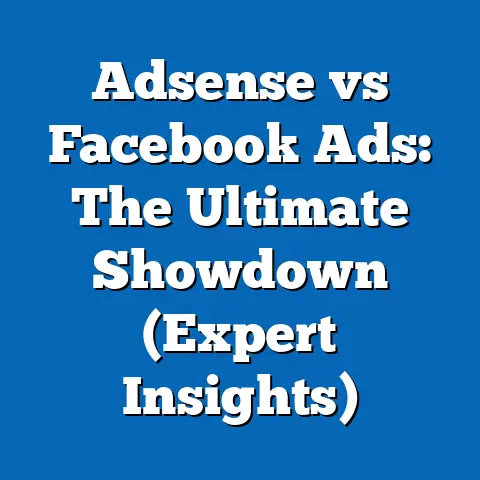Unlocking Facebook Eavesdropping Ads (Mastering Privacy Issues)
“I can’t believe how ads seem to know exactly what I’m thinking.
It feels like Facebook is eavesdropping on my conversations!” – Sarah Miller, Small Business Owner, Austin, TX.
This quote, echoed by countless Facebook users, perfectly encapsulates the unease surrounding targeted advertising on the platform.
It’s a sentiment I’ve personally heard time and again from friends, family, and even clients.
The feeling that Facebook is somehow “listening in” to our private conversations and thoughts, only to then bombard us with eerily relevant ads, is unsettling, to say the least.
While the idea of Facebook actively “eavesdropping” is largely a misconception, the underlying concerns about data privacy and targeted advertising are very real.
In this article, I’ll delve into the complexities of Facebook’s advertising model, explore the reasons behind this perception of “eavesdropping,” and, most importantly, provide actionable strategies for advertisers to navigate these privacy issues responsibly and ethically.
We’ll examine the fine line between effective targeting and respecting user privacy, offering a roadmap for building trust and achieving advertising success without crossing the line.
Understanding Facebook’s Advertising Model
Facebook’s advertising prowess stems from its sophisticated data collection and analysis capabilities.
It’s not about actively listening to your conversations through your phone’s microphone (though that conspiracy theory stubbornly persists).
Instead, it’s a much more nuanced and multifaceted process.
Data Collection Methods: A Deep Dive
Facebook gathers data from a variety of sources, including:
- Directly Provided Information: This includes everything you willingly share on your profile – your age, gender, location, interests, relationship status, education, and job title.
It’s the information you consciously fill out when creating or updating your profile. - Behavioral Data: Facebook tracks your activity on the platform, including the pages you like, the groups you join, the posts you interact with, the videos you watch, and the links you click.
This paints a detailed picture of your interests and preferences. - Website and App Tracking (via the Facebook Pixel): The Facebook Pixel is a small piece of code that website owners can install on their sites.
This allows Facebook to track user activity on those websites, even if the user doesn’t click on a Facebook ad.
This data is then used to retarget users who have visited specific pages or taken specific actions on the website. - Offline Activity (via Partner Integrations): Facebook partners with various businesses and data brokers to collect information about your offline activity, such as purchases you make in physical stores or loyalty programs you participate in.
This allows Facebook to connect your online and offline behavior. - Mobile Device Information: Facebook collects information about your mobile device, including its operating system, device model, IP address, and mobile carrier.
This information can be used to identify you and track your location.
The Role of Algorithms in Targeted Advertising
Once Facebook has collected all this data, it uses sophisticated algorithms to analyze it and create detailed user profiles.
These algorithms identify patterns and correlations in your behavior, allowing Facebook to predict your interests, needs, and preferences with remarkable accuracy.
This data is then used to target ads to specific users based on their likelihood of being interested in the product or service being advertised.
The more data Facebook has about you, the more accurately it can target ads, leading to higher click-through rates and conversion rates for advertisers.
I’ve seen firsthand how granular targeting can dramatically improve campaign performance, sometimes doubling or even tripling ROI.
The Effectiveness of Facebook Ads: By the Numbers
Facebook remains a powerhouse in the digital advertising landscape.
Here are a few key statistics highlighting its effectiveness:
- Reach: Facebook boasts over 2.9 billion monthly active users, providing advertisers with unparalleled reach.
- Ad Revenue: In 2023, Facebook generated over $116 billion in advertising revenue, demonstrating its continued dominance in the market.
- ROI: Studies have shown that Facebook ads can generate a significant return on investment, with some businesses reporting an average ROI of 5x or more.
- Conversion Rates: Facebook ads can drive significant conversions, particularly when targeted effectively.
I’ve personally witnessed conversion rates jump by as much as 30% when implementing advanced targeting strategies.
Key Takeaway: Facebook’s advertising model relies on extensive data collection and sophisticated algorithms to target ads to specific users.
While this can be highly effective for advertisers, it also raises significant privacy concerns.
The Concept of “Eavesdropping” in Advertising
The term “eavesdropping” in the context of Facebook advertising is often used to describe the feeling that ads are appearing based on conversations or thoughts that haven’t been explicitly shared online.
While Facebook denies actively listening to users’ conversations, the perception of eavesdropping persists.
Anecdotal Evidence and User Experiences
I’ve heard countless stories from people who swear that Facebook ads are based on their private conversations.
For example, someone might be discussing a new restaurant with a friend in person, only to see an ad for that restaurant pop up on their Facebook feed later that day.
While these experiences are often attributed to Facebook “eavesdropping,” there are other possible explanations.
For example, the user might have searched for the restaurant online, visited its website, or mentioned it in a text message that was analyzed by AI.
Or, it could simply be a coincidence.
However, the sheer number of these anecdotes suggests that something more is at play.
Even if Facebook isn’t actively listening to conversations, its data collection and analysis capabilities are so advanced that it can often predict what users are thinking or talking about.
The History of Facebook’s Data Privacy Scandals
The perception of Facebook “eavesdropping” is also fueled by the company’s history of data privacy scandals.
The Cambridge Analytica scandal, in which data from millions of Facebook users was harvested without their consent, is a prime example.
This scandal eroded trust in Facebook and raised serious questions about the company’s commitment to protecting user privacy.
I remember when the Cambridge Analytica scandal broke.
It was a wake-up call for many, myself included.
It highlighted the potential for abuse when data is collected and used without proper safeguards.
It also made me realize the importance of being more mindful of the data I share online and the privacy settings I use on social media platforms.
Key Takeaway: The perception of Facebook “eavesdropping” is fueled by anecdotal evidence, advanced data analysis, and the company’s history of data privacy scandals.
This perception erodes trust in Facebook and raises concerns about the ethical implications of targeted advertising.
Privacy Issues Surrounding Facebook Ads
Facebook’s advertising practices raise a number of significant privacy issues, including:
- Data Collection Without Explicit Consent: Facebook often collects data about users without their explicit consent.
For example, the Facebook Pixel tracks user activity on websites even if the user doesn’t click on a Facebook ad. - Data Sharing with Third Parties: Facebook shares user data with third-party advertisers and data brokers.
This data can be used to target users with ads on other platforms and to create detailed user profiles for marketing purposes. - Lack of Transparency: Facebook is often opaque about its data collection and usage practices.
It can be difficult for users to understand what data is being collected about them and how it is being used. - Potential for Discrimination: Facebook’s advertising algorithms can be used to discriminate against certain groups of people.
For example, ads for housing or employment can be targeted based on race, ethnicity, or gender.
Key Regulations and Laws Affecting Facebook’s Data Collection
In response to these privacy concerns, governments around the world have enacted regulations and laws aimed at protecting user data.
Some of the most important regulations include:
- General Data Protection Regulation (GDPR): The GDPR is a European Union law that regulates the collection and processing of personal data.
It requires companies to obtain explicit consent from users before collecting their data and to provide users with access to their data and the ability to delete it. - California Consumer Privacy Act (CCPA): The CCPA is a California law that gives consumers the right to know what personal data is being collected about them, the right to delete their data, and the right to opt out of the sale of their data.
- Other State-Level Laws: Several other states in the US are also considering or have already enacted similar data privacy laws.
Implications of These Laws for Users and Advertisers
These laws have significant implications for both users and advertisers.
Users now have more control over their data and the ability to protect their privacy.
Advertisers, on the other hand, must comply with these regulations or face significant fines.
This means that advertisers need to be more transparent about their data collection and usage practices, obtain explicit consent from users before collecting their data, and provide users with access to their data and the ability to delete it.
In my experience, complying with these regulations, while initially challenging, can actually build trust with users and improve brand reputation in the long run.
Key Takeaway: Facebook’s advertising practices raise significant privacy issues that are addressed by regulations like GDPR and CCPA.
Advertisers must comply with these regulations to protect user privacy and avoid legal penalties.
User Perception and Trust
User perception of privacy significantly impacts trust in Facebook as an advertising platform.
The more concerned users are about their privacy, the less likely they are to trust Facebook and engage with its ads.
Survey Results and Studies on User Attitudes
Several surveys and studies have explored user attitudes towards targeted advertising and privacy.
Some key findings include:
- Privacy Concerns are Widespread: A majority of internet users are concerned about their privacy online, particularly on social media platforms like Facebook.
- Targeted Ads are Viewed Negatively: Many users view targeted ads as intrusive and creepy, particularly when they are based on sensitive information.
- Trust in Facebook is Low: Trust in Facebook has declined in recent years due to data privacy scandals and concerns about misinformation.
- Privacy is a Deciding Factor: Privacy concerns can influence users’ decisions about whether to use a platform, engage with ads, or make purchases from businesses that advertise on Facebook.
How Negative Perceptions Affect Brand Reputation
Negative perceptions of Facebook’s privacy practices can also affect brand reputation.
If users believe that a brand is advertising on a platform that doesn’t respect their privacy, they may be less likely to trust that brand and purchase its products or services.
I’ve seen brands suffer significant reputational damage as a result of being associated with Facebook’s privacy controversies.
Key Takeaway: User perception of privacy significantly impacts trust in Facebook and the brands that advertise on the platform.
Negative perceptions can erode trust and damage brand reputation.
Strategies for Mastering Privacy in Facebook Advertising
To navigate these privacy issues and maintain user trust, advertisers need to adopt responsible and ethical advertising practices.
Here are some key strategies:
Transparency in Data Collection and User Consent
The first step is to be transparent about your data collection and usage practices.
Clearly explain to users what data you are collecting, how you are using it, and why.
Obtain explicit consent from users before collecting their data, and provide them with easy-to-use tools to manage their privacy settings.
Utilizing Facebook’s Advertising Tools Responsibly
Facebook offers a range of advertising tools that can be used to target ads to specific audiences.
However, it’s important to use these tools responsibly and avoid targeting users based on sensitive information.
- Custom Audiences: Custom Audiences allow you to target ads to people who have already interacted with your business, such as website visitors or email subscribers.
This can be a highly effective way to reach a relevant audience without relying on sensitive data.
I’ve found that Custom Audiences consistently outperform broader targeting options. - Lookalike Audiences: Lookalike Audiences allow you to target ads to people who are similar to your existing customers.
This can be a good way to expand your reach while still targeting a relevant audience.
However, it’s important to be mindful of the data that is being used to create the Lookalike Audience and avoid using sensitive data. - Interest-Based Targeting: Interest-based targeting allows you to target ads to people who have expressed interest in specific topics or activities.
This can be a useful way to reach a broad audience, but it’s important to avoid targeting users based on sensitive interests.
Tips for Respecting User Privacy
Here are some additional tips for respecting user privacy in your Facebook advertising campaigns:
- Avoid Targeting Based on Sensitive Attributes: Don’t target ads based on race, ethnicity, gender, religion, sexual orientation, or other sensitive attributes.
- Use Data Minimization: Only collect the data that is absolutely necessary for your advertising campaigns.
- Provide Users with Control: Give users control over their data and the ability to opt out of targeted advertising.
- Monitor Your Campaigns: Regularly monitor your campaigns to ensure that they are not violating user privacy.
Key Takeaway: Advertisers can master privacy issues in Facebook advertising by being transparent, using Facebook’s advertising tools responsibly, and respecting user privacy.
The Future of Facebook Advertising and Privacy
The future of Facebook advertising is likely to be shaped by increasing privacy concerns and regulations.
As users become more aware of their privacy rights, they will demand greater control over their data and more transparency from advertisers.
Potential Changes to Facebook’s Advertising Model
Facebook may need to make significant changes to its advertising model to address these privacy concerns.
Some potential changes include:
- Enhanced Privacy Controls: Facebook could provide users with more granular privacy controls, allowing them to choose what data is collected about them and how it is used.
- Data Anonymization: Facebook could anonymize user data to prevent it from being linked to individual users.
- Contextual Advertising: Facebook could shift towards contextual advertising, which targets ads based on the content of the page being viewed rather than the user’s personal data.
The Role of AI and Machine Learning
Technological advancements like AI and machine learning could also play a role in shaping the future of Facebook advertising.
AI could be used to develop more privacy-friendly targeting methods, such as contextual advertising or predictive targeting based on aggregated data.
However, AI could also be used to further enhance data collection and analysis, raising even more privacy concerns.
It’s important that AI is used responsibly and ethically in the context of Facebook advertising.
Rebuilding Trust with Users
Ultimately, the future of Facebook advertising depends on rebuilding trust with users.
Facebook needs to demonstrate a genuine commitment to protecting user privacy and being transparent about its data practices.
By earning back user trust, Facebook can ensure the long-term viability of its advertising platform.
Key Takeaway: The future of Facebook advertising will be shaped by increasing privacy concerns and regulations.
Facebook may need to make significant changes to its advertising model and rebuild trust with users to ensure the long-term viability of its platform.
Conclusion
The perception of Facebook “eavesdropping” may be a myth, but the underlying concerns about data privacy and targeted advertising are very real.
Advertisers need to be aware of these concerns and adopt responsible and ethical advertising practices to maintain user trust and avoid legal penalties.
By being transparent about data collection, using Facebook’s advertising tools responsibly, and respecting user privacy, advertisers can navigate these privacy issues and achieve advertising success without crossing the line.
While it might seem like a challenge, embracing privacy-conscious advertising can actually be a competitive advantage, building stronger relationships with customers and fostering long-term brand loyalty.
Remember, the key is to find the right balance between effective targeting and respecting user privacy.
By doing so, you can unlock the power of Facebook advertising while building a more ethical and sustainable advertising ecosystem.
Call to Action
Reflect on your own experiences with Facebook ads and consider how you can be more aware of your privacy settings and data usage.
As advertisers, let’s commit to using our power responsibly, ensuring that our campaigns are not only effective but also ethical and respectful of user privacy.
Let’s work together to build a future where advertising and privacy can coexist harmoniously.
What steps will you take today to be more mindful of privacy in your Facebook advertising efforts?






